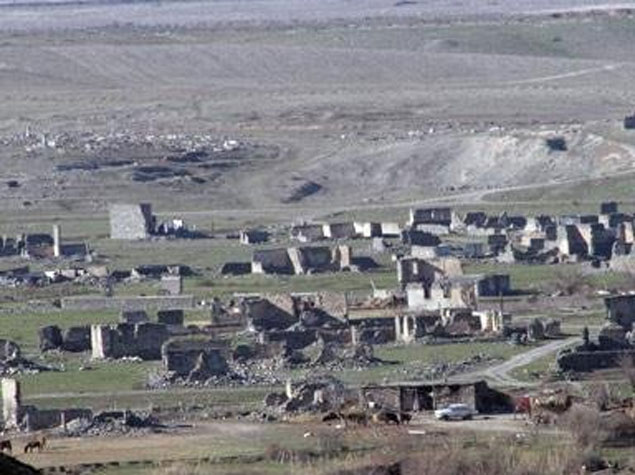Ruling party urges to counter use of occupied territories for drug production

By Sara Rajabova
Significant action should be taken to curb the use of the Armenian-occupied territories of Azerbaijan for drug production, deputy chairman of the ruling Yeni (New) Azerbaijan Party Ali Ahmadov told media on June 13.
As a result of recent operations conducted by the Azerbaijani Ministry of National Security, 12 people involved in drug smuggling from Iran were exposed. Around 40.5 kilograms of narcotic substances were seized. It was ascertained that some drugs withdrawn from the circulation had been cultivated and harvested in the occupied Azerbaijani territories. Then, these drugs were delivered to Iran and from there to Azerbaijan.
Ahmadov pointed out that Azerbaijani official circles and representatives of international organizations have repeatedly made well-founded statements about the use of the occupied Azerbaijani territories for drug production. "This fact confirms the previously made statements," he said.
International organizations are concerned about this problem, and this will encourage the organizations combating drug trafficking to deal with the issue more thoroughly, he added.
"This makes it even more necessary to free Azerbaijani lands and ensure Azerbaijan's territorial integrity, as well as suppress drug production in the occupied territories which can cause great harm to the health of people living in the region and the whole of mankind," Ahmadov said.
Over 20 percent of Azerbaijan's internationally recognized territory, including Nagorno-Karabakh and seven adjacent regions, has been occupied by Armenian armed forces since a lengthy war in the early 1990s. The UN Security Council has adopted four resolutions on Armenian withdrawal from the Azerbaijani territories, but they have not been enforced to this day.
Besides, MP and member of the Political Council of the Yeni Azerbaijan Party Aydin Mirzazade told Trend news agency that the Armenian-occupied territories are used for making "dirty money".
Regarding the fact that the Ministry of National Security (MNS) of Azerbaijan has detected drug cultivation in the occupied territories to be smuggled to Iran and then to Azerbaijan, he said Azerbaijan has repeatedly informed international organizations of drug cultivation in its occupied territories, and sufficient evidence was found in this regard.
"This time there is another serious argument. The groups involved in drug cultivation in Iran have tried to smuggle to Azerbaijan narcotic substances grown in Nagorno-Karabakh," Mirzazade said.
The MP added that since Nagorno-Karabakh is isolated from the world and has no prospects for development, these territories are used for earning "dirty money".
"Since these areas are occupied by the Armenian armed forces, large plantations of drugs have been planted there with the aim of making money by smuggling drugs through Iran to Azerbaijan and from there to Russia and Europe. This is no different from the drug trade in Afghanistan," Mirzazade said.
He noted that from an economic point of view, Armenia cannot develop the occupied territories and cannot solve the infrastructure and social problems there.
Nagorno-Karabakh is known as a place of cultivation of narcotic drugs and a base for training terrorists, Mirzazade said.
"In this regard, Azerbaijan has repeatedly raised the alarm in its appeals to international organizations and the operation conducted by the MNS has identified additional evidence for this," he said.
Meanwhile, MP, member of the parliamentary committee on security and defense Zahid Oruj said that the military regime of Nagorno-Karabakh considers illicit activities as a source of revenue.
For many years, Azerbaijan has been informing international institutions of the illegal actions taken by the Armenians in Nagorno-Karabakh and expressing its official position, Oruj said.
Speaking about international organizations' efforts in this area, he said they take a hard line against drug trafficking, but, unfortunately, do not consider Nagorno-Karabakh in this sense.
"We have quite substantial grounds to file a lawsuit against Armenia and the military regime of Nagorno-Karabakh. Having systematized the illegal activities of the Armenians, we should submit materials to international legal institutions. How is it possible that sanctions are imposed in connection with illicit drug trafficking and operations from Iran, Afghanistan and other countries, while Karabakh appears to be patronized by someone?" Oruj said, adding that the Armenian side uses this activity "as a real weapon against Azerbaijan".
Earlier, Deputy Prime Minister Ali Hasanov, who chairs the State Commission on the Fight against Drug Addiction and Illicit Drug Trafficking, said that because of the lack of proper control, the occupied territories of Azerbaijan are used as transit territory for trafficking in narcotics from Afghanistan to the CIS countries and Europe. Hasanov said that there are three routes of illicit drug transit across the country: Afghanistan-Pakistan-Iran-Azerbaijan, Afghanistan-Iran-Azerbaijan and Afghanistan-Central Asia-Azerbaijan. He added that there is also another illicit drug transit route which is not included in the map of international illicit drug transit routes and that is the Afghanistan-Iran-Nagorno-Karabakh route.
Given the urgency of the problem of controlling illicit trafficking, intensive work is underway in Azerbaijan to establish legal basis for combating such crimes.
Azerbaijan has joined the 1961, 1971 and 1988 UN conventions on narcotic drugs, psychotropic substances and the fight against illegal circulation of precursors, and concluded bilateral and multilateral agreements and memoranda with a number of countries on combating drugs.
Besides the three UN conventions, Azerbaijan is party to the Partial Agreement establishing the Pompidou Group of the Council of Europe on cooperation in combating drug abuse and trafficking in drugs.
